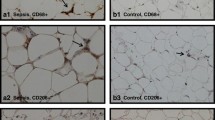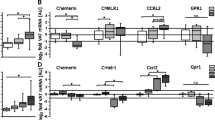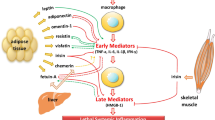Abstract
Purpose
To assess changes in peroxisome proliferator-activated receptor-γ (PPARγ) in peripheral blood mononuclear cells (PBMC) from critically ill children with sepsis. Additionally, to investigate the effects of sepsis on the endogenous activator of PPARγ, 15-deoxy-∆12,14-PGJ2 (15d-PGJ2), and the downstream targets of PPARγ activity, adiponectin and resistin.
Methods
Single-center, prospective case–control study in critically ill children with systemic inflammatory response syndrome, sepsis or septic shock.
Results
PPARγ nuclear protein expression was decreased but PPARγ activity was increased in PBMC from children with septic shock compared with controls. PPARγ activity on day 1 was significantly higher in patients with higher pediatric risk of mortality (PRISM) score compared with controls [mean 0.22 optical density (OD) ± standard error of the mean (SEM) 0.03 versus 0.12 OD ± 0.02; p < 0.001]. Patients with resolved sepsis had increased levels of the endogenous PPARγ ligand, 15d-PGJ2, compared with patients with systemic inflammatory response syndrome (SIRS) and septic shock (77.7 ± 21.7 versus 58 ± 16.5 pg/ml; p = 0.03). Plasma high-molecular-weight adiponectin (HMWA) and resistin levels were increased in patients with septic shock on day 1 and were significantly higher in patients with higher PRISM scores. Nonsurvivors from sepsis had higher resistin levels on the first day of hospitalization compared with survivors from septic shock [660 ng/ml, interquartile range (IQR) 585–833 ng/ml versus 143 ng/ml, IQR 66–342 ng/ml; p < 0.05].
Conclusions
Sepsis is associated with altered PPARγ expression and activity in PBMC. Plasma adipokines correlate with risk of mortality scores in sepsis and may be useful biomarkers. Further studies are needed to understand the mechanisms underlying changes in PPARγ in sepsis.




Similar content being viewed by others
References
Ricote M, Li AC, Willson TM, Kelly CJ, Glass CK (1998) The peroxisome proliferator-activated receptor-gamma is a negative regulator of macrophage activation. Nature 391:79–82
Jiang C, Ting AT, Seed B (1998) PPAR-gamma agonists inhibit production of monocyte inflammatory cytokines. Nature 391:82–86
Kliewer SA, Lenhard JM, Willson TM, Patel I, Morris DC, Lehmann JM (1995) A prostaglandin J2 metabolite binds peroxisome proliferator-activated receptor gamma and promotes adipocyte differentiation. Cell 83:813–819
Palmer CN, Hsu MH, Griffin HJ, Johnson EF (1995) Novel sequence determinants in peroxisome proliferator signaling. J Biol Chem 270:16114–16121
Straus DS, Pascual G, Li M, Welch JS, Ricote M, Hsiang CH, Sengchanthalangsy LL, Ghosh G, Glass CK (2000) 15-deoxy-delta 12, 14-prostaglandin J2 inhibits multiple steps in the NF-kappa B signaling pathway. Proc Natl Acad Sci USA 97:4844–4849
Kaplan J, Cook JA, O’Connor M, Zingarelli B (2007) Peroxisome proliferator-activated receptor gamma is required for the inhibitory effect of ciglitazone but not 15-deoxy-Delta 12, 14-prostaglandin J2 on the NFkappaB pathway in human endothelial cells. Shock 28:722–726
Zingarelli B, Sheehan M, Hake PW, O’Connor M, Denenberg A, Cook JA (2003) Peroxisome proliferator activator receptor-gamma ligands, 15-deoxy-delta(12, 14)-prostaglandin J2 and ciglitazone, reduce systemic inflammation in polymicrobial sepsis by modulation of signal transduction pathways. J Immunol 171:6827–6837
Kaplan JM, Cook JA, Hake PW, O’Connor M, Burroughs TJ, Zingarelli B (2005) 15-deoxy-delta12, 14-prostaglandin J2 (15D-PGJ2), a peroxisome proliferator activated receptor gamma ligand, reduces tissue leukosequestration and mortality in endotoxic shock. Shock 24:59–65
Haraguchi G, Kosuge H, Maejima Y, Suzuki J, Imai T, Yoshida M, Isobe M (2008) Pioglitazone reduces systematic inflammation and improves mortality in apolipoprotein E knockout mice with sepsis. Intensive Care Med 34:1304–1312
Zhou M, Wu R, Dong W, Simms HH, Wang P (2004) Hepatic peroxisome proliferator-activated receptor-gamma (PPAR-gamma) is downregulated in sepsis. Shock 21:39
Culver DA, Barna BP, Raychaudhuri B, Bonfield TL, Abraham S, Malur A, Farver CF, Kavuru MS, Thomassen MJ (2004) Peroxisome proliferator-activated receptor gamma activity is deficient in alveolar macrophages in pulmonary sarcoidosis. Am J Respir Cell Mol Biol 30:1–5
Han X, Osuntokun B, Benight N, Loesch K, Frank SJ, Denson LA (2006) Signal transducer and activator of transcription 5b promotes mucosal tolerance in pediatric Crohn’s disease and murine colitis. Am J Pathol 169:1999–2013
Klotz L, Schmidt M, Giese T, Sastre M, Knolle P, Klockgether T, Heneka MT (2005) Proinflammatory stimulation and pioglitazone treatment regulate peroxisome proliferator-activated receptor gamma levels in peripheral blood mononuclear cells from healthy controls and multiple sclerosis patients. J Immunol 175:4948–4955
van den Akker EL, Koper JW, Joosten K, de Jong FH, Hazelzet JA, Lamberts SW, Hokken-Koelega AC (2009) Glucocorticoid receptor mRNA levels are selectively decreased in neutrophils of children with sepsis. Intensive Care Med 35:1247–1254
Reddy RC, Narala VR, Keshamouni VG, Milam JE, Newstead MW, Standiford TJ (2008) Sepsis-induced inhibition of neutrophil chemotaxis is mediated by activation of peroxisome proliferator-activated receptor-{gamma}. Blood 112:4250–4258
Soller M, Tautenhahn A, Brune B, Zacharowski K, John S, Link H, von Knethen A (2006) Peroxisome proliferator-activated receptor gamma contributes to T lymphocyte apoptosis during sepsis. J Leukoc Biol 79:235–243
Goldstein B, Giroir B, Randolph A (2005) International pediatric sepsis consensus conference: definitions for sepsis and organ dysfunction in pediatrics. Pediatr Crit Care Med 6:2–8
Pollack MM, Ruttimann UE, Getson PR (1988) Pediatric risk of mortality (PRISM) score. Crit Care Med 16:1110–1116
Pajvani UB, Hawkins M, Combs TP, Rajala MW, Doebber T, Berger JP, Wagner JA, Wu M, Knopps A, Xiang AH, Utzschneider KM, Kahn SE, Olefsky JM, Buchanan TA, Scherer PE (2004) Complex distribution, not absolute amount of adiponectin, correlates with thiazolidinedione-mediated improvement in insulin sensitivity. J Biol Chem 279:12152–12162
Zhou M, Wu R, Dong W, Jacob A, Wang P (2008) Endotoxin downregulates peroxisome proliferator-activated receptor-gamma via the increase in TNF-alpha release. Am J Physiol Regul Integr Comp Physiol 294:R84–R92
Han J, Hajjar DP, Tauras JM, Feng J, Gotto AM Jr, Nicholson AC (2000) Transforming growth factor-beta1 (TGF-beta1) and TGF-beta2 decrease expression of CD36, the type B scavenger receptor, through mitogen-activated protein kinase phosphorylation of peroxisome proliferator-activated receptor-gamma. J Biol Chem 275:1241–1246
Camp HS, Tafuri SR (1997) Regulation of peroxisome proliferator-activated receptor gamma activity by mitogen-activated protein kinase. J Biol Chem 272:10811–10816
Adams M, Reginato MJ, Shao D, Lazar MA, Chatterjee VK (1997) Transcriptional activation by peroxisome proliferator-activated receptor gamma is inhibited by phosphorylation at a consensus mitogen-activated protein kinase site. J Biol Chem 272:5128–5132
Hauser S, Adelmant G, Sarraf P, Wright HM, Mueller E, Spiegelman BM (2000) Degradation of the peroxisome proliferator-activated receptor gamma is linked to ligand-dependent activation. J Biol Chem 275:18527–18533
Shan ZZ, Masuko-Hongo K, Dai SM, Nakamura H, Kato T, Nishioka K (2004) A potential role of 15-deoxy-delta(12, 14)-prostaglandin J2 for induction of human articular chondrocyte apoptosis in arthritis. J Biol Chem 279:37939–37950
Gilroy DW, Colville-Nash PR, Willis D, Chivers J, Paul-Clark MJ, Willoughby DA (1999) Inducible cyclooxygenase may have anti-inflammatory properties. Nat Med 5:698–701
Shibata T, Kondo M, Osawa T, Shibata N, Kobayashi M, Uchida K (2002) 15-deoxy-delta 12, 14-prostaglandin J2. A prostaglandin D2 metabolite generated during inflammatory processes. J Biol Chem 277:10459–10466
Sunden-Cullberg J, Nystrom T, Lee ML, Mullins GE, Tokics L, Andersson J, Norrby-Teglund A, Treutiger CJ (2007) Pronounced elevation of resistin correlates with severity of disease in severe sepsis and septic shock. Crit Care Med 35:1536–1542
Kawanami D, Maemura K, Takeda N, Harada T, Nojiri T, Imai Y, Manabe I, Utsunomiya K, Nagai R (2004) Direct reciprocal effects of resistin and adiponectin on vascular endothelial cells: a new insight into adipocytokine-endothelial cell interactions. Biochem Biophys Res Commun 314:415–419
Bokarewa M, Nagaev I, Dahlberg L, Smith U, Tarkowski A (2005) Resistin, an adipokine with potent proinflammatory properties. J Immunol 174:5789–5795
Lu SC, Shieh WY, Chen CY, Hsu SC, Chen HL (2002) Lipopolysaccharide increases resistin gene expression in vivo and in vitro. FEBS Lett 530:158–162
Way JM, Gorgun CZ, Tong Q, Uysal KT, Brown KK, Harrington WW, Oliver WR Jr, Willson TM, Kliewer SA, Hotamisligil GS (2001) Adipose tissue resistin expression is severely suppressed in obesity and stimulated by peroxisome proliferator-activated receptor gamma agonists. J Biol Chem 276:25651–25653
Iwaki M, Matsuda M, Maeda N, Funahashi T, Matsuzawa Y, Makishima M, Shimomura I (2003) Induction of adiponectin, a fat-derived antidiabetic and antiatherogenic factor, by nuclear receptors. Diabetes 52:1655–1663
Maeda N, Takahashi M, Funahashi T, Kihara S, Nishizawa H, Kishida K, Nagaretani H, Matsuda M, Komuro R, Ouchi N, Kuriyama H, Hotta K, Nakamura T, Shimomura I, Matsuzawa Y (2001) PPARgamma ligands increase expression and plasma concentrations of adiponectin, an adipose-derived protein. Diabetes 50:2094–2099
Combs TP, Wagner JA, Berger J, Doebber T, Wang WJ, Zhang BB, Tanen M, Berg AH, O’Rahilly S, Savage DB, Chatterjee K, Weiss S, Larson PJ, Gottesdiener KM, Gertz BJ, Charron MJ, Scherer PE, Moller DE (2002) Induction of adipocyte complement-related protein of 30 kilodaltons by PPARgamma agonists: a potential mechanism of insulin sensitization. Endocrinology 143:998–1007
Teoh H, Quan A, Bang KW, Wang G, Lovren F, Vu V, Haitsma JJ, Szmitko PE, Al-Omran M, Wang CH, Gupta M, Peterson MD, Zhang H, Chan L, Freedman J, Sweeney G, Verma S (2008) Adiponectin deficiency promotes endothelial activation and profoundly exacerbates sepsis-related mortality. Am J Physiol Endocrinol Metab 295:E658–E664
Uji Y, Yamamoto H, Tsuchihashi H, Maeda K, Funahashi T, Shimomura I, Shimizu T, Endo Y, Tani T (2009) Adiponectin deficiency is associated with severe polymicrobial sepsis, high inflammatory cytokine levels, and high mortality. Surgery 145:550–557
Keller P, Moller K, Krabbe KS, Pedersen BK (2003) Circulating adiponectin levels during human endotoxaemia. Clin Exp Immunol 134:107–110
Anderson PD, Mehta NN, Wolfe ML, Hinkle CC, Pruscino L, Comiskey LL, Tabita-Martinez J, Sellers KF, Rickels MR, Ahima RS, Reilly MP (2007) Innate immunity modulates adipokines in humans. J Clin Endocrinol Metab 92:2272–2279
Lehmann JM, Lenhard JM, Oliver BB, Ringold GM, Kliewer SA (1997) Peroxisome proliferator-activated receptors alpha and gamma are activated by indomethacin and other non-steroidal anti-inflammatory drugs. J Biol Chem 272:3406–3410
Acknowledgments
We would like to thank the parents who enrolled their children into this study during an emotionally difficult time. Supported, in part, by grants K12 HD028827 (J.M.K.), T32 ES10957 (J.M.K.), R01 GM067202 (B.Z.), and R01 GM064619 (H.W.) from the NIH, Bethesda, MD, and by the Translational Research Initiative at Cincinnati Children’s Hospital Medical Center (J.M.K.).
Author information
Authors and Affiliations
Corresponding author
Electronic supplementary material
Below is the link to the electronic supplementary material.
Rights and permissions
About this article
Cite this article
Kaplan, J.M., Denenberg, A., Monaco, M. et al. Changes in peroxisome proliferator-activated receptor-gamma activity in children with septic shock. Intensive Care Med 36, 123–130 (2010). https://doi.org/10.1007/s00134-009-1654-6
Received:
Accepted:
Published:
Issue Date:
DOI: https://doi.org/10.1007/s00134-009-1654-6




